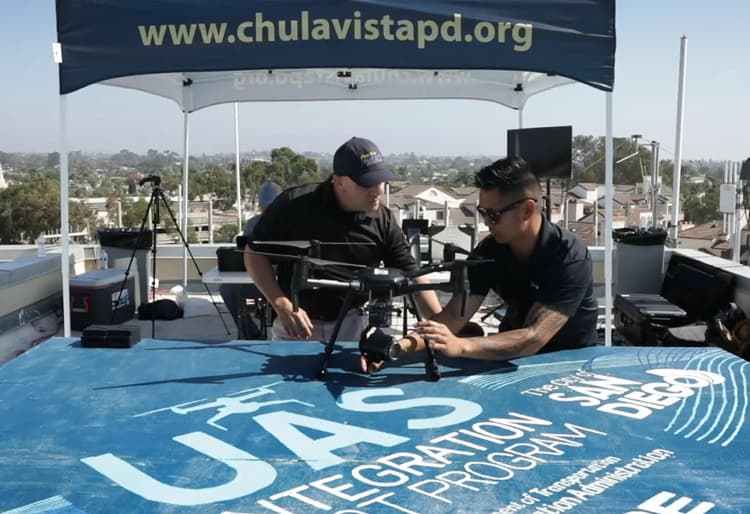CVPD Admits Police Drones Violate Residents’ Personal Privacy

By Alberto Garcia
Investigative Reporter
The Chula Vista Police Department admits they are violating residents’ personal privacy by recording videos that capture residents’ faces, license plates, and activities within their own backyards by unmanned aerial systems, or drones, flown over the entire City.
The City is challenging a recent Appeals Court decision that found the police cannot use a blanket exemption to the California Records Act to shield the release of drone videos that are not connected to actual criminal investigations. The three-judge panel voted unanimously with no dissenting opinions.
In their arguments to defend their case, the City and CVPD admit that releasing any videos to the public would violate people’s privacy, proving that their drones have already recorded residents in ways that violate their constitutional rights to privacy.
Last week, the City announced the City Council authorized an appeal to the California Supreme Court to continue to fight the release of copies of any police drone videos.
“The City declined to provide the copies, because doing so might have violated individual privacy rights,” a press release from the City’s Communication Manager stated. “The City would have had to manually review and redact every video recording to protect information considered personal, such as images of faces, license plates, backyards, and more.” The statement did not explain what “and more” meant.
On January 9th, the Chula Vista City Council voted 5-0 in closed session to authorize the petition to the California Supreme Court. Mayor John McCann made the motion, seconded by Councilman Jose Preciado. Councilmembers Andrea Cardenas, Carolina Chavez, and Alonso Gonzalez also supported the motion.
The case stems from an April 2021 request filed by Arturo Castañares, Publisher of La Prensa San Diego, that asked to review CVPD drone videos from March 2021 for a story on how the police were using the new technology as the first police agency in the country allowed by the FAA to fly drones as first responders.
The police department denied the request claiming that all of its police drone videos are exempt from disclosure as investigative records, a narrow exemption that is meant to protect records that could jeopardize ongoing criminal investigations. The City also claimed that releasing the videos would violate individuals’ personal privacy.
“We have never argued that the police should not use drones, only that they should release public records according to existing state law,” Castañares said after the City’s announcement of its Supreme Court petition. “We are fighting to protect the public’s constitutional rights to public records and to their personal privacy.”
In late December, the Fourth District Court of Appeals ruled that the City cannot use a blanket investigative records exemption to shield the videos without first reviewing the videos to confirm whether or not they are, in fact, connected to a concrete specific investigation. The City had argued that reviewing the videos would be too time-consuming and costly.
The case was published by the Appeals Court, making it a new precedent that can be cited in future cases seeking public documents from police agencies.
The Appeals Court decision remanded the case back to the local Superior Court to establish a process where the City can divide the videos into three categories; those connected to investigations and inquiries which would be exempt from disclosure, and videos where no investigation continued after the drone flight and must be released under the California Public Records Act.
“If the police argues that releasing videos would violate people’s personal privacy then they are admitting they already violated the people’s privacy by recording them in the first place,” Castañares argued. “The police have no special right to violate our privacy in the name of public safety, so arguing they are protecting our privacy is just a cover to withhold the videos against existing law.”
The Supreme Court has 60 days to decide what action it will take on the petition. The Court could deny the petition and let the Appeals Court decision stand, or agree to hear the case sometime later this year.
If the Supreme Court later upholds the case, the new precedent would apply statewide instead of only within the current Appeals Court District of San Diego and Imperial Counties.
The case is Castañares v. City of Chula Vista.







